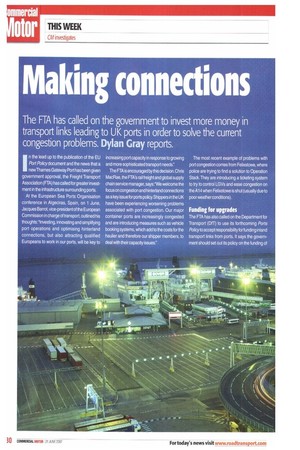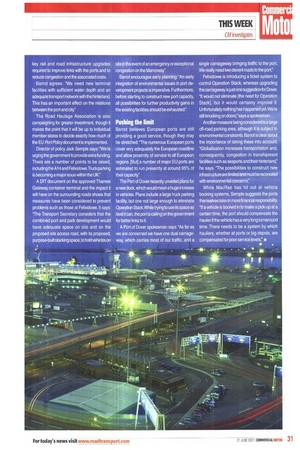Makiring connedio
Page 30

Page 31

If you've noticed an error in this article please click here to report it so we can fix it.
The FTA has called on the government to invest more money in transport links leading to UK ports in order to solve the current congestion problems. Dylan Gray reports.
In the lead up to the publication of the EU Port Policy document and the news that a new Thames Gateway Port has been given government approval, the Freight Transport Association (RA) has called for greater investment in the infrastructure surrounding ports.
At the European Sea Ports Organisation conference in Algeciras, Spain, on 1 June, Jacques Barrot, vice-president of the European Commission in charge of transport, outlined his thoughts: "Investing, innovating and simplifying port operations and optimising hinterland connections, but also attracting qualified Europeans to work in our ports, will be key to increasing port capacity in response to growing and more sophisticated transport needs!'
The FTA is encouraged bythisdecision.Chris MacRae. the FTA's rail freight and global supply chain service manager, says: -We welcome the focus on congestion and hinterland connections as a key issue for ports policy. Shippers in the UK have been experiencing worsening problems associated with port congestion. Our major container ports are increasingly congested and are introducing measures such as vehicle booking systems, which add to the costs for the haulier and therefore our shipper members, to deal with their capacity issues,"
The most recent example of problems with port congestion comes from Felixstowe, where police are trying to find a solution to Operation Stack. They are introducing a ticketing system to try to control LGVs and ease congestion on the Al 4 when Felixstowe is shut (usually due to poor weather conditions).
Funding for upgrades
The FTA has also called on the Department for Transport (DfT) to use its forthcoming Ports Poky to accept responsibility for funding inland transport links from ports. It says the government should set out its policy on the funding of key rail and road infrastructure upgrades required to improve links with the ports and to reduce congestion and the associated costs.
Barrot agrees. We need new terminal facilities with sufficient water depth and an adequate transport network with the hinterland. This has an important effect on the relations between the port and city" The Road Haulage Association is also campaigning for greater investment, though it makes the point that it will be up to individual member states to decide exactly how much of the EU Port Policydocument is implemented.
Director of policy Jack Semple says: "We're urging the government to provide extra funding. There are a number of points to be raised, including the A14 and Felixstowe.Truck parking is becoming a major issue within the UK:' A DfT document on the approved Thames Gateway container terminal and the impact it will have on the surrounding roads shows that measures have been considered to prevent problems such as those at Felixstowe. It says: "The Transport Secretary considers that the combined port and park development would have adequate space on site and on the proposed site access road, with its proposed, purpose-built stacking space, to holdvehicleson site in the event of an emergency or exceptional congestion on the Manorway:" Barrot encourages early planning: "An early integration of environmental issues in port development projects is imperative. Furthermore, before starting to construct new port capacity, all possibilities for further productivity gains in the existing facilities should be exhausted."
Pushing the limit
Barrot believes European ports are still providing a good service, though they may be stretched: "The numerous European ports cover very adequately the European coastline and allow proximity of service to all European regions [But] a number of major EU ports are estimated to run presently at around 95% of their capacity" The Port of Dover recently unveiled plans for a new dock, which would mean a huge increase in vehicles. Plans include a large truck parking facility, but one not large enough to eliminate Operation Stack.While trying to use its space as best it can, the port is calling on the government for better links to it A Port of Dover spokesman says: "As far as we are concerned we have one dual carriageway, which carries most of our traffic, and a single carriageway bringing traffic to the port. We really need two decent roads to the port."
Felixstowe is introducing a ticket system to control Operation Stack, whereas upgrading the carriageway is just one suggestion for Dover. 'It would not eliminate [the need for Operation Stack], but it would certainly improve it. Unfortunately nothing has happened yet.We're still knocking on doors," says a spokesman.
Another measure being considered is a large off-road parking area, although it is subject to environmental constraints. Barrot is clear about the importance of taking these into account. "Globalisation increases transportation and, consequently, congestion in transhipment facilities such as seaports and their hinterland," he says. "The possibilities to construct new infrastructure are limited and must be reconciled with environmental concerns."
While MacRae has hit out at vehicle booking systems, Semple suggests the ports themselves take on more financial responsibility "If a vehicle is booked in to make a pick-up at a certain time, the port should compensate the haulier if the vehicle has a very long turnaround time There needs to be a system by which hauliers, whether at ports or big depots, are compensated for poor service levels." m
























































































































































































































